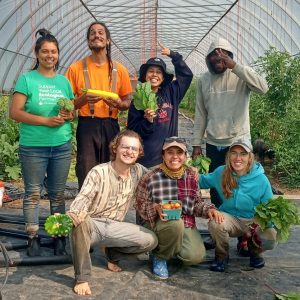What is Organic Farming & Gardening?
By definition, organic farming and gardening, also known as organic agriculture or ecological farming or biological farming, is an agricultural system that emphasizes the use of naturally occurring, non-synthetic inputs, such as compost manure, green manure, and bone meal and places emphasis on techniques such as crop rotation, companion planting, and mixed cropping. Biological pest control methods such as the fostering of insect predators are also encouraged.
Organic agriculture is defined as "an integrated farming system that strives for sustainability, the enhancement of soil fertility and biological diversity while, with rare exceptions, prohibiting synthetic pesticides, antibiotics, synthetic fertilizers, genetically modified organisms, and growth hormones".
What are the Basic Guidelines of Organic Farming?
Every organic agriculture system is different. Different climates, land features, crops grown and community expectations determine how organic farming is done. At the same time, nearly all organic systems have things in common:
- Crop Rotation: This means growing one crop in a field this year and a different, complimentary crop the following year. Rotating crops is good for the soil and reduces the number of pests. For example, beans and other leguminous plants help soil by adding nitrogen which leads to advantages for later crops. Corn is a heavy feeder, meaning it drains the soil of nutrients and when rotated with legumes the following year, the soil has an opportunity to rejuvenate.
- Green Manuring: The practice of green manures are known as cover crops which are grown to improve the nutrients and general condition of the soil. Cover crops are usually seeded into a field after a harvest. These crops are usually tilled under at the end of their growth cycle. When added to soil, they contribute to its structure and bring extra microbes.
- Composting: Compost forms the basis of all activities in organic gardening and farming. Organic waste, including crop leftovers, food trimmings, and animal manure, is transformed in the process into a soil additive that increases soil quality and structure.
- Biological Pest Control: Beneficial insectssuch as bees, ladybugs, birds, or microbial solutions are used by organic farmers to help address pests, rather than chemical insecticides. This action forms a larger strategy called Integrated Pest Management (IPM).
- Organic Pesticides: Natural substances that meet strict regulations may be used in place of synthetic pesticides like neem oil, diatomaceous earth, and pyrethrum. Because they are less dangerous to the environment, they are not very harmful to important insects.
How can a Backyard Gardener Utilize Organic Practices?
Backyard gardeners and hobby farmers can bring organic methods to their own backyards by integrating just a few practices.
- Reduce soil compaction by building raised beds.
- Reduce soil compaction by using no-till methods.
- Use companion planting to naturally prevent pests and promote pollination.
- Use mulch to help retain water and suppress weeds.
- Utilize rainwater harvesting which leads to less wasted water.
Resources:
Wikipedia
The Gardener.org



